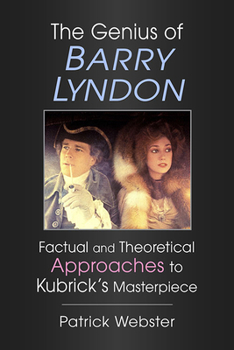The Genius of Barry Lyndon: Factual and Theoretical Approaches to Kubrick's Masterpiece
One of the most visually compelling films ever made, Barry Lyndon can--and should, argues the author--be seen as Stanley Kubrick's masterpiece. This comprehensive analysis examines such topics as the unique way in which Kubrick photographed the film, Kubrick's subtle understanding of cinematic storytelling, the deliberate upturning of generic expectation, and the eclectic use of music. It also provides a more rigorous reading of the film from a diverse range of theoretical approaches: structuralist, feminist, psychoanalytical, Marxist and postcolonial readings.
Format:Paperback
Language:English
ISBN:1476689970
ISBN13:9781476689975
Release Date:April 2024
Publisher:McFarland & Company
Length:284 Pages
Weight:0.93 lbs.
Dimensions:0.6" x 6.0" x 9.0"
Age Range:18 years and up
Customer Reviews
0 rating





